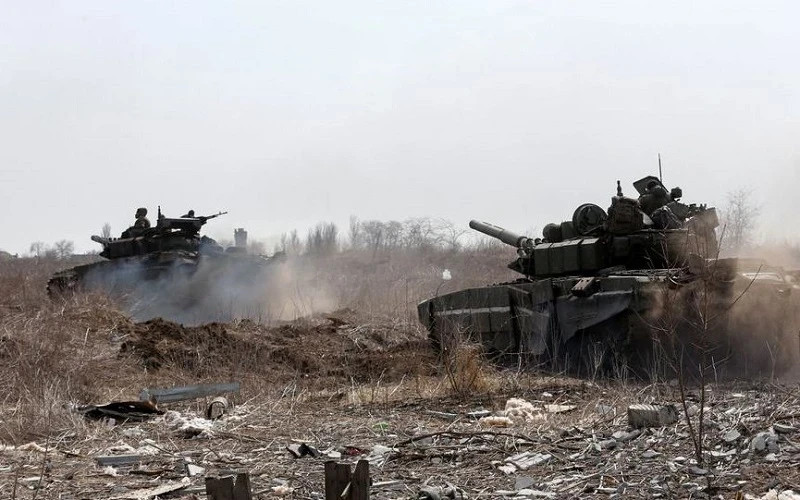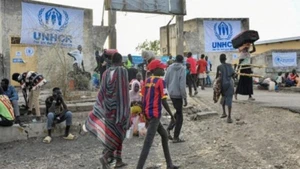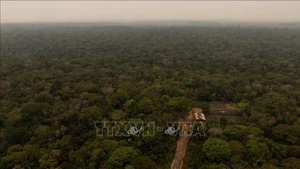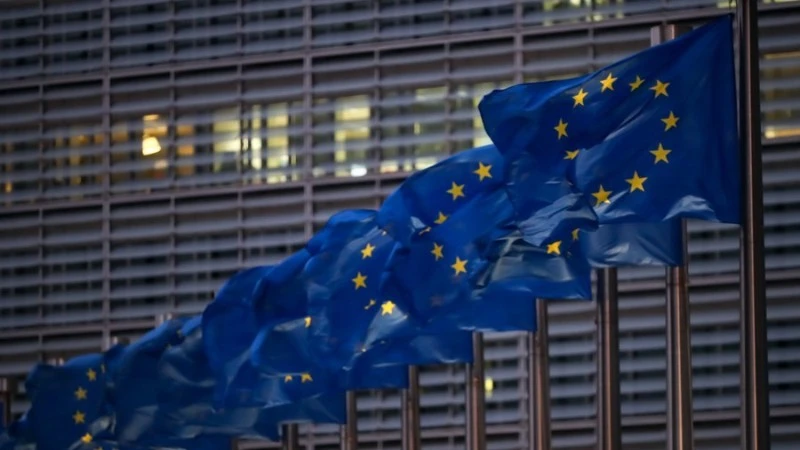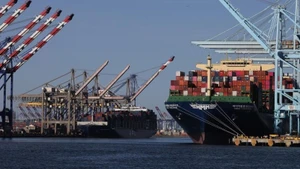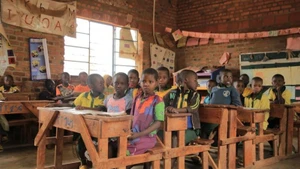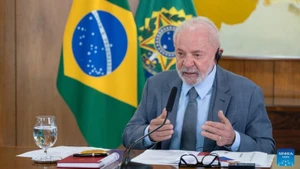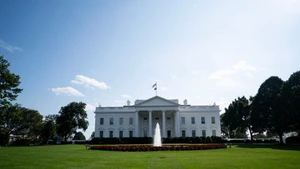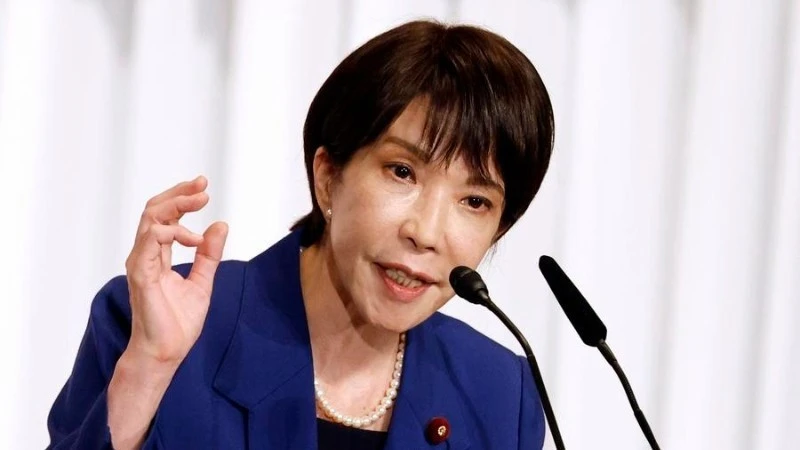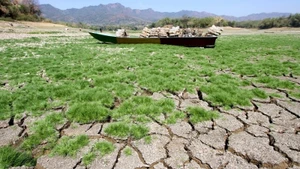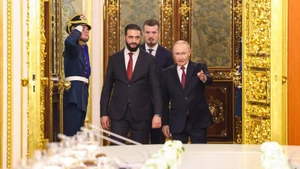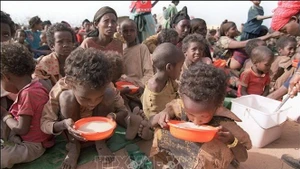Fierce confrontation
Two years since the conflict broke out, Russian and Ukrainian forces are still in a standoff on the battlefield, despite efforts to find a peaceful solution. Ukraine continues to call for large-scale military support from the West. To date, the West has provided or pledged to send more weapons to Ukraine than in the early stages of the conflict.
NATO Secretary General Jens Stoltenberg reaffirmed the military support commitments to Ukraine that NATO countries have recently made worth billions of dollars and affirmed NATO's long-term support to Ukraine.
The European Union (EU) also announced that it will stand firmly by Ukraine financially, economically, and militarily.
Most recently, the EU approved an aid package worth 54 billion USD for Ukraine; European members of NATO also affirmed to provide more weapons and ammunition to Ukraine.
According to estimates by the Estonian Ministry of Defence, Western countries need to contribute 0.25% of their GDP in military assistance for Ukraine to continue the war in 2024 and prepare for a new counterattack in 2025.
The conflict in Ukraine has pushed tensions between Russia and the West to a new level, with increasingly harsh sanctions and retaliation against each other.
The EU has agreed on the 13th package of sanctions against Russia related to the special military campaign in Ukraine. This new sanctions package targets nearly 200 additional Russian entities and individuals accused of involvement in the two-year conflict.
US President Joe Biden also announced the largest package of sanctions that the US has imposed on Russia since the Russia-Ukraine conflict broke out. The sanctions are imposed on over 500 targets in Russia's financial sector, defence industrial base, procurement networks and sanction evaders across multiple continents.
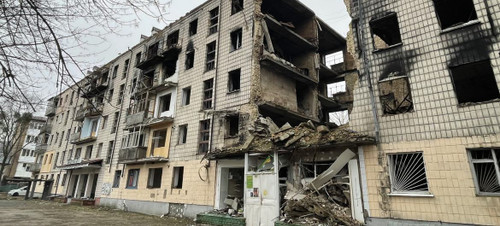 |
| Destroyed buildings in the village of Borodyanka, in the Kiev region of Ukraine. (Photo: UN News) |
In response to the West's latest sanctions package, the Russian Foreign Ministry recently announced that Moscow has expanded the list of European Union (EU) officials and politicians banned from entering the country.
It said the stop list included representatives of law enforcement agencies and commercial organisations who provided military assistance to Ukraine, representatives of European institutions involved in the prosecution of Russian officials, and those who gathered material to support the idea of confiscating Russian state assets.
The Russian retaliatory 'stop list' also includes representatives of the Council of Europe, members of the legislative assemblies of European Union countries, and members of the OSCE PA (Parliamentary Assembly of the Organisation for Security and Co-operation in Europe) and the PACE (Parliamentary Assembly of the Council of Europe).
The conflict between Russia and the West has been deepened since NATO admitted Finland in April 2023 and gave Sweden the green light to join the bloc.
The unpredictable consequences
The conflict has devastated Ukraine's infrastructure, causing heavy loss of life and property. The fighting has caused thousands of casualties, forced millions of people to flee their homes, and damaged many infrastructures, such as schools and hospitals.
The conflict also affected the entire world by disrupting supply chains, pushing up food and energy prices, and severely affecting the lives of many people, especially the poor.
The loss of its most effective energy partner – Russia, has left Europe reeling. Energy prices were one of the main factors that caused a loss of more than 216 USD billion to Germany during the two-year conflict in Ukraine, as Europe's largest economy lost energy supplies from Russia.
Internal conflicts in many EU countries have also deepened as the bloc's support measures for Ukraine were considered to affect people's interests, leading to a wave of protests by farmers over the past several months.
Even in Poland, although Warsaw always declared its support for Ukraine, protests by Polish farmers who demand not to import wheat from Ukraine have caused deep disagreement between the two countries.
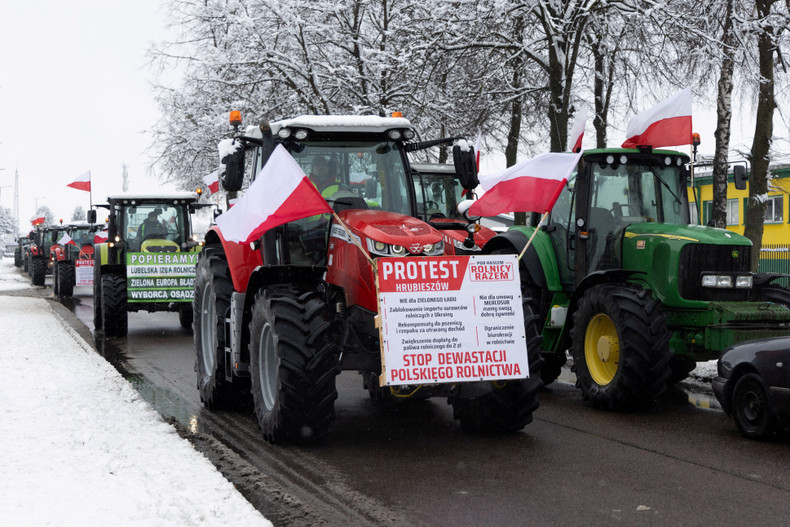 |
| Polish farmers protest near the border with Ukraine over price pressures, taxes and green regulation, grievances shared by farmers across Europe, in Hrubieszow, Poland, February 9, 2024. (Photo: REUTERS) |
In recent weeks, Polish farmers have blocked the border between the two countries to protest Ukraine's duty-free agricultural exports, which they said reduce domestic output.
The Polish government stated that Warsaw and Kyiv are far from reaching an agreement on the issue of Ukrainian agricultural products. Ukrainian Prime Minister Denys Shmyhal affirmed that Ukraine has the right to apply "responsive measures".
Meanwhile, Russia is said to have found a way to limit the impact of the Western sanctions chain. According to data from the Russian Federal State Statistics Service (Rosstat), Russia's economic growth in 2023 was 3.6%, higher than the government's commitments.
Russian oil exporters have also adapted very quickly to sanctions, as Russian oil production decreased by only 1% in 2023 and exports continued to generate the foreign exchange needed to stabilise the domestic market.
However, both Russia and Ukraine suffered losses due to the prolonged conflict. According to calculations by the US Department of Defence, Russia has probably spent up to 211 billion USD during the two years of conducting the special military campaign in Ukraine.
A joint study published by the World Bank, the United Nations, the European Commission and the Government of Ukraine in February 2024, showed that the total cost of rebuilding Ukraine over the next decade is estimated at 486 billion USD, which is about 2.8 times Ukraine's nominal GDP for 2023.
The conflict has undermined the very foundations of our UN Charter and disrupted the delicate balance of international relations – at a time when unity, solidarity and cooperation are absolutely crucial to multilateral problem-solving.
UN General Assembly President Dennis Francis
At a United Nations General Assembly’s special session on the Russia-Ukraine conflict, UN General Assembly President Dennis Francis expressed concern that the conflict has undermined the very foundations of our UN Charter and disrupted the delicate balance of international relations – at a time when unity, solidarity and cooperation are absolutely crucial to multilateral problem-solving.
He warned that the conflict is not only directly harming the countries involved but also impeding progress in many others, especially developing nations.
The Assembly President called for redoubling efforts to end wars and usher in a future of hope, promise and prosperity for the people in Ukraine and Russia alike – and elsewhere, without exception.
While addressing the UN Security Council’s special session to discuss the Russia-Ukraine conflict, UN Secretary-General António Guterres emphasised that it is high time for peace – a just peace based on the United Nations Charter, international law, and General Assembly resolutions.
The Russia-Ukraine conflict has led to many crises, seriously affecting the international political, economic, and security situation. The consequences cannot be fully measured, and the world needs to increase efforts to find solutions to end conflicts and bring about comprehensive and sustainable peace.
